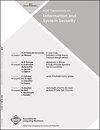两种RFID隐私概念及其关系
Q Engineering
ACM Transactions on Information and System Security
Pub Date : 2011-12-01
DOI:10.1145/2043628.2043631
引用次数: 11
摘要
RFID系统的隐私性越来越受到RFID社区的关注。基本上,文献中有两种RFID隐私概念:一种基于两个标签的不可区分性,表示为独立隐私,另一种基于RFID协议输出的不可预测性,表示为非独立隐私。在本文中,我们首先回顾现有的基于不可预测性的RFID隐私模型,并指出它们的局限性。然后,我们提出了一种新的RFID隐私模型,表示为unp*-隐私,基于真实标签和虚拟标签的不可区分性。我们正式澄清了它与独立隐私模型的关系。证明了ind-privacy比unp -privacy弱。此外,确定了RFID标签实现unp*隐私的最小(必要和充分)条件。研究表明,如果一个RFID系统是unp*私有的,那么只要RFID系统是完整健全的,那么一个RFID标签的计算能力就可以用来构造一个伪随机函数族。另一方面,如果每个标签都能够计算一个伪随机函数,则可以使用这些标签构建具有unp*-隐私的RFID系统。从这个意义上说,伪随机函数族是对RFID标签计算能力的最小要求,以实现RFID系统隐私。最后,提出了一种满足最小要求的RFID互认证协议。本文章由计算机程序翻译,如有差异,请以英文原文为准。
On two RFID privacy notions and their relations
Privacy of RFID systems is receiving increasing attention in the RFID community. Basically, there are two kinds of RFID privacy notions in the literature: one based on the indistinguishability of two tags, denoted as ind-privacy, and the other based on the unpredictability of the output of an RFID protocol, denoted as unp-privacy. In this article, we first revisit the existing unpredictability-based RFID privacy models and point out their limitations. We then propose a new RFID privacy model, denoted as unp*-privacy, based on the indistinguishability of a real tag and a virtual tag. We formally clarify its relationship with the ind-privacy model. It is proven that ind-privacy is weaker than unp*-privacy. Moreover, the minimal (necessary and sufficient) condition on RFID tags to achieve unp*-privacy is determined. It is shown that if an RFID system is unp*-private, then the computational power of an RFID tag can be used to construct a pseudorandom function family provided that the RFID system is complete and sound. On the other hand, if each tag is able to compute a pseudorandom function, then the tags can be used to construct an RFID system with unp*-privacy. In this sense, a pseudorandom function family is the minimal requirement on an RFID tag's computational power for enforcing RFID system privacy. Finally, a new RFID mutual authentication protocol is proposed to satisfy the minimal requirement.
求助全文
通过发布文献求助,成功后即可免费获取论文全文。
去求助
来源期刊

ACM Transactions on Information and System Security
工程技术-计算机:信息系统
CiteScore
4.50
自引率
0.00%
发文量
0
审稿时长
3.3 months
期刊介绍:
ISSEC is a scholarly, scientific journal that publishes original research papers in all areas of information and system security, including technologies, systems, applications, and policies.
 求助内容:
求助内容: 应助结果提醒方式:
应助结果提醒方式:


